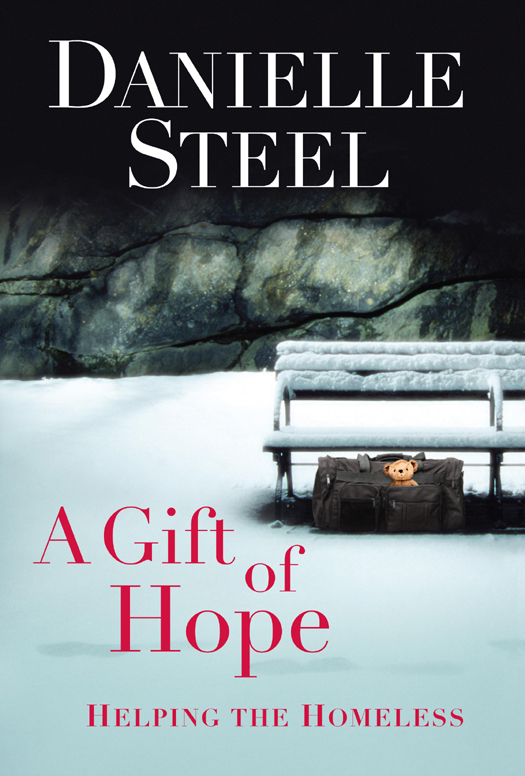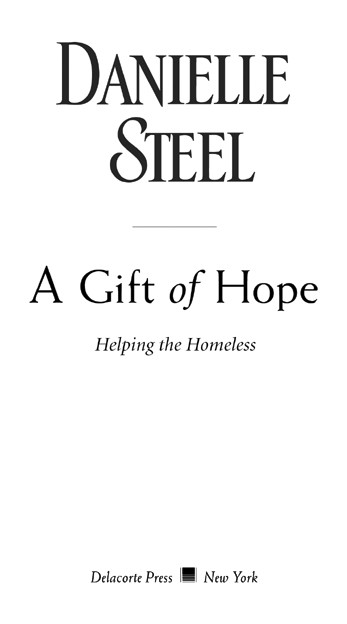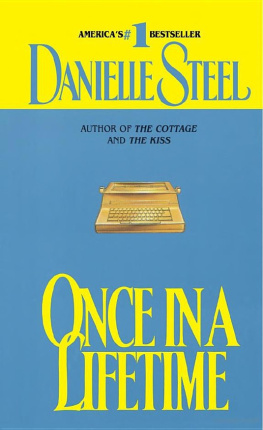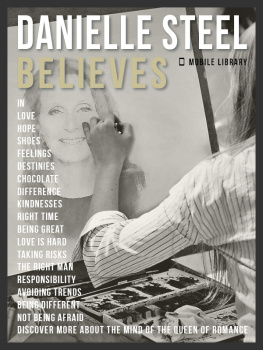Danielle Steel - A Gift of Hope: Helping the Homeless
Here you can read online Danielle Steel - A Gift of Hope: Helping the Homeless full text of the book (entire story) in english for free. Download pdf and epub, get meaning, cover and reviews about this ebook. genre: Non-fiction. Description of the work, (preface) as well as reviews are available. Best literature library LitArk.com created for fans of good reading and offers a wide selection of genres:
Romance novel
Science fiction
Adventure
Detective
Science
History
Home and family
Prose
Art
Politics
Computer
Non-fiction
Religion
Business
Children
Humor
Choose a favorite category and find really read worthwhile books. Enjoy immersion in the world of imagination, feel the emotions of the characters or learn something new for yourself, make an fascinating discovery.

- Book:A Gift of Hope: Helping the Homeless
- Author:
- Genre:
- Rating:5 / 5
- Favourites:Add to favourites
- Your mark:
- 100
- 1
- 2
- 3
- 4
- 5
A Gift of Hope: Helping the Homeless: summary, description and annotation
We offer to read an annotation, description, summary or preface (depends on what the author of the book "A Gift of Hope: Helping the Homeless" wrote himself). If you haven't found the necessary information about the book — write in the comments, we will try to find it.
A Gift of Hope: Helping the Homeless — read online for free the complete book (whole text) full work
Below is the text of the book, divided by pages. System saving the place of the last page read, allows you to conveniently read the book "A Gift of Hope: Helping the Homeless" online for free, without having to search again every time where you left off. Put a bookmark, and you can go to the page where you finished reading at any time.
Font size:
Interval:
Bookmark:


Copyright 2012 by Danielle Steel
All rights reserved.
Published in the United States by Delacorte Press, an imprint of The Random House Publishing Group, a division of Random House, Inc., New York.
D ELACORTE P RESS is a registered trademark of Random House, Inc., and the colophon is a trademark of Random House, Inc.
LIBRARY OF CONGRESS CATALOGING-IN-PUBLICATION DATA
Steel, Danielle.
A gift of hope: helping the homeless / Danielle Steel.
p. cm.
eISBN: 978-0-345-53137-7
1. HomelessnessUnited States. 2. Homeless personsUnited States. 3. Steel, Danielle. I. Title.
HV4505.S737 2012
362.50973dc23
2011017260
www.bantamdell.com
Cover design: Mary Ann Smith
Cover image: Creative Crop/Jupiter Images (bear)
Andy Crawford/Getty Images (duffle bag)
Jose Azel/Getty Images (snowy bench and rock wall)
v3.1_r1
Were it not for Hope,
the heart would break.
Scottish proverb

F or eleven years, I worked on the streets with the homeless, and without question it altered my life. It is life-changing to be there, to look into the eyes of people who are lost, suffering, sick in body and mind, most of whom have lost hope. They are the forgotten people, whom no one wants to think about or know. For most people its terrifying to acknowledge them, or see themwhat if that could happen to us? Its a horrifying thought. There but for the grace of God
Ive watched people quietly disintegrate on the streets, and seen some of them go from people without a place to live to people who have no life, no hope, no way out. Some have disappeared, some have died, some of the young ones have gone home, some have gotten help from the available programs and agencies, but most of them are still out there, their situation worsening day by day. And in our fragile economy, the number of people on the streets has increased exponentially.
My goals were never lofty. At first I had no goals at all. In my own grief at having lost a son, I tried to help people who appeared to be in as much pain as I, even if for different reasons. I began to learn what they needed, practically, and to supply those needs. And eventually I realized that my mission, if you can call it that, was only to keep them alive until real help could address their broader needs. My focus was small and specific: to keep them alive on the streets, to keep them warm and dry and fed, to make them as comfortable as possible in a terrible situation. It was all I could do. I am not a political person, I have no influence on city government, I didnt have enough money to save them all. Im not a physician or a psychiatrist to address their medical problems. I was one person who wanted to do what I could, with the help of ten others who helped me form what became a very efficient team. We went out night after night, dealt with whatever we found, and served three hundred people a night, three or four thousand a year. We gave them clean, warm new clothing, tools they needed, hygiene supplies, a few practical things like umbrellas and flashlights, pens and pads, and safe, healthy packaged food. And I hope that along the way, we saved a life or twoor more.
Right from the beginning, it was essential to me to remain anonymous in this work, both to the people I served, and in the larger world. I remained convinced that it was completely unimportant who I was. We created something unique, helping to keep the homeless alive on the streets, giving them what they needed most acutely. I felt that my identity was irrelevant and could only get in the way. It didnt matter who I was. Talking about my work on the streets served no purpose either. I was sure that anyone who knew about it would view it with contempt or suspicion, or use it as a springboard to publicity that I didnt want. I wanted to do the work as quietly and invisibly as possible, and I never deviated from that until finally, with what I had learned, I felt that speaking up for them would help them more than my silence.
I am lending the homeless my voice now, so that others will think about them and see their plight. If I, who have walked among them for eleven years and care about them, dont speak for them, who will? Although I have always said that I would never do this, and have done everything I could to stay below the radar, I have finally realized that I need to speak up and share what Ive learned. I can be the voice in the world they do not have. There are more people than ever on the streets, there is less and less money available to help them, and some of the laws regarding hospitalization of the mentally ill need to change. But before anything can change, people must be willing to see the homeless and not pretend they arent there. They so desperately need our help, in so many ways. And we cannot help or change what we refuse to see.
There is so much that needs to be done, and the smallest effort matters and makes a difference: clothing, meals, medical treatment, psychiatric help, wound care, a ride to an emergency room, a blanket, a kind hand. There is much for even the uninitiated to do. And it takes many to do it.
So this book is a call for help. There are too few of us reaching out to those on the streets, in a silent, unseen war where too many lives are being lost, when in fact so many more could be saved if only people knew, or cared. There are in fact several groups in every city, working diligently to help the homeless in any way they can, and many of them privately organized and funded when city and state governments dont do enough to help.
The homeless need so many things from us. In addition to housing, medical care, mental health care, and job training, they need a strong hand to help them up. And aside from what we can do practically, we need to share our strength and give them hope: the hope that things can change, and the courage to hang on.
I didnt realize it at the time, but along with the supplies we handed out, we gave them hope. We stopped our vans, we jumped out, we walked up to people who had never seen us before and probably wouldnt again, and we handed them bags filled with what they needed to survive for weeks or even months. And we wanted nothing in return. Nothing. They didnt have to embrace our religion, our beliefs, our politics. They didnt need to know where we came from, or why. They didnt even need to say thank you, although they always did, always. And for one shining instant, they knew with total certainty that someone cared, and fell out of the sky to help them, like an answer to their prayers. It led them to believe that good things could happen again. It showed that someone cared. It gave them hope, which was our most important gift to them.

T he homeless outreach team that changed my life, and that of many others, began at a very dark time for me. My son Nick showed signs of suffering from bipolar disease from his earliest childhood. At eighteen months, I found him different, and precocious long before that (he walked at eight months and spoke in full sentences in two languages when he was a year old). At four, I was convinced that he was manic. When he was five, I sought advice from doctors and psychiatrists who brushed off my concerns, and assured me he was fine. And when he was seven, I alternated between panic and despair, convinced that he was sick, begging for help for him, while every doctor I consulted reassured me and insisted there was nothing wrong. I have a great fondness now for doctors who respect the bond that mothers have with their children and acknowledge that we know them best of all. I knew my son was sick, but no professional would agree.
Font size:
Interval:
Bookmark:
Similar books «A Gift of Hope: Helping the Homeless»
Look at similar books to A Gift of Hope: Helping the Homeless. We have selected literature similar in name and meaning in the hope of providing readers with more options to find new, interesting, not yet read works.
Discussion, reviews of the book A Gift of Hope: Helping the Homeless and just readers' own opinions. Leave your comments, write what you think about the work, its meaning or the main characters. Specify what exactly you liked and what you didn't like, and why you think so.













